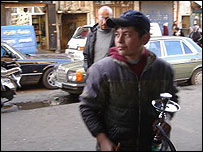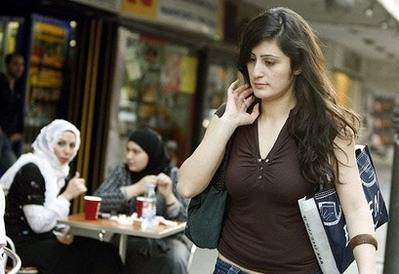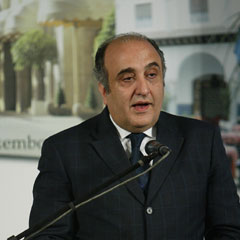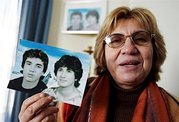 By Mike Sergeant, Their faces are covered in dirt. Their hands are tough and grimy. Their eyes have been hardened by years of adult labour. Lebanon’s child workers lost their playfulness a long time ago. According to some estimates, up to 100,000 children – some as young as eight years old – work in Lebanon. The problem is getting worse because of the long-running political crisis in the country, and growing economic uncertainty here. Stroll down some of the inner city streets in Tripoli and you can see young boys sawing, painting, hammering and welding. During what should be school time, there are children hard at work in almost every workshop, garage and cafe.
By Mike Sergeant, Their faces are covered in dirt. Their hands are tough and grimy. Their eyes have been hardened by years of adult labour. Lebanon’s child workers lost their playfulness a long time ago. According to some estimates, up to 100,000 children – some as young as eight years old – work in Lebanon. The problem is getting worse because of the long-running political crisis in the country, and growing economic uncertainty here. Stroll down some of the inner city streets in Tripoli and you can see young boys sawing, painting, hammering and welding. During what should be school time, there are children hard at work in almost every workshop, garage and cafe.
Necessity: Mahmoud, 14, lives in a world of machines, tools and dirt and spends his days cutting wood and making furniture. He tells me he last went to school three years ago. Studying is no longer an option. His family needs the money, so he puts in 12-hour shifts for couple of dollars a day. Lebanon signed an international convention in 2001 which included a series of measures to curb the worst forms of child labour. But – due to total political deadlock here – nothing has been implemented. The children don’t complain about their situation. For many, school was just a brief interlude before the real business of life began. Some say they are still ambitious to become doctors, lawyers or bankers. Few seem to realise those avenues are probably already closed.
 by Rana Moussaoui, BEIRUT (AFP) – Lebanese women may be known as the Arab world’s most liberal but they are by no means the region’s most liberated considering antiquated laws that reduce them to second-class citizens. "The law in this country still considers a woman as being inferior," complained sociologist Rafif Sidaoui. From domestic violence to rape to adultery, the rights of women often fall by the wayside in this multi-confessional sectarian society, nonetheless deemed avant-garde in the mostly conservative Middle East. "One of the absurd laws on the books allows a rapist to be exempt from prison if he marries his victim," said Ezzat Mroue, vice-president of the Women’s Rights Committee (WRC). "A few years ago, there was a major scandal when a young man, who was after his cousin, kidnapped her from her university," she added. "He raped her and then brought her before a sheikh who married them. "The result was that he was not guilty in the eyes of the law," Mroue said.
by Rana Moussaoui, BEIRUT (AFP) – Lebanese women may be known as the Arab world’s most liberal but they are by no means the region’s most liberated considering antiquated laws that reduce them to second-class citizens. "The law in this country still considers a woman as being inferior," complained sociologist Rafif Sidaoui. From domestic violence to rape to adultery, the rights of women often fall by the wayside in this multi-confessional sectarian society, nonetheless deemed avant-garde in the mostly conservative Middle East. "One of the absurd laws on the books allows a rapist to be exempt from prison if he marries his victim," said Ezzat Mroue, vice-president of the Women’s Rights Committee (WRC). "A few years ago, there was a major scandal when a young man, who was after his cousin, kidnapped her from her university," she added. "He raped her and then brought her before a sheikh who married them. "The result was that he was not guilty in the eyes of the law," Mroue said.
 March 2008 (IRIN) ,
March 2008 (IRIN) ,  BEIRUT: The Association of Lebanese Industrialists (ALI) plans to file a lawsuit against the government for failing to protect local industry against unfair foreign competition, the head of the group said on Monday. "We have had enough. The government must understand that local industry can no longer stay in business if the free trade agreements are not respected by Arab countries," Fadi Abboud told The Daily Star.Lebanese industrialists argue that most Arab states that have signed free trade agreements with Lebanon subsidize the cost of energy, which is essential for the manufacturing sector.
BEIRUT: The Association of Lebanese Industrialists (ALI) plans to file a lawsuit against the government for failing to protect local industry against unfair foreign competition, the head of the group said on Monday. "We have had enough. The government must understand that local industry can no longer stay in business if the free trade agreements are not respected by Arab countries," Fadi Abboud told The Daily Star.Lebanese industrialists argue that most Arab states that have signed free trade agreements with Lebanon subsidize the cost of energy, which is essential for the manufacturing sector. CAIRO (AFP)–U.S. Secretary of State Condoleezza Rice defended the deployment of a U.S. warship off the coast of Lebanon, saying it was designed to show Washington’s readiness to defend its allies’ interests."As to the American military presence, the U.S. exercise a military presence in the region and it has for a very long time," Rice told reporters in Cairo at a news conference with her Egyptian counterpart Ahmed Abul Gheit. "It is simply to make very clear that the U.S. is capable and willing of defending its interests and the interests of its allies. That is really all that is happening there," she said.
CAIRO (AFP)–U.S. Secretary of State Condoleezza Rice defended the deployment of a U.S. warship off the coast of Lebanon, saying it was designed to show Washington’s readiness to defend its allies’ interests."As to the American military presence, the U.S. exercise a military presence in the region and it has for a very long time," Rice told reporters in Cairo at a news conference with her Egyptian counterpart Ahmed Abul Gheit. "It is simply to make very clear that the U.S. is capable and willing of defending its interests and the interests of its allies. That is really all that is happening there," she said. الـى أيـن يأخذنـا السياسيـون ؟ سؤالٌ يتردد على لسان كل مواطن يشعر أن أوضاع البلاد تتردَّى يوماً بعد يوم سياسياً واقتصادِياً ومَعيشياً ، كما يشعر أن الأمنَ مهدَّدٌ بالخطب الناريَّة والشَّحنِ الطائفيّ والمذهبيّ ، وأنه مهددٌ بالإرهابِ الذي يَضربُ بين الحينِ والآخر فيَنجوَ منه الناس بالصدفة على بركة الله .
الـى أيـن يأخذنـا السياسيـون ؟ سؤالٌ يتردد على لسان كل مواطن يشعر أن أوضاع البلاد تتردَّى يوماً بعد يوم سياسياً واقتصادِياً ومَعيشياً ، كما يشعر أن الأمنَ مهدَّدٌ بالخطب الناريَّة والشَّحنِ الطائفيّ والمذهبيّ ، وأنه مهددٌ بالإرهابِ الذي يَضربُ بين الحينِ والآخر فيَنجوَ منه الناس بالصدفة على بركة الله .  by Sylvie Briand, Mariam Saidi spends her days creating clay busts of her beloved son who vanished without a trace 26 years ago, aged only 16, in the midst of the savage civil war which tore through Lebanon. Sitting in her little apartment on the outskirts of Beirut, the mother of five clutches a faded photograph of Maher Kassir and recalls how he disappeared after becoming embroiled in the sectarian violence which blighted the country.
by Sylvie Briand, Mariam Saidi spends her days creating clay busts of her beloved son who vanished without a trace 26 years ago, aged only 16, in the midst of the savage civil war which tore through Lebanon. Sitting in her little apartment on the outskirts of Beirut, the mother of five clutches a faded photograph of Maher Kassir and recalls how he disappeared after becoming embroiled in the sectarian violence which blighted the country.


